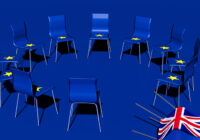After a Pyrrhic victory, Theresa May faces “the most crucial negotiations in Britain’s recent history with a shredded reputation, a divided party, a slowing economy and the clock ticking away.”
Even though James Comey’s testimony took center stage this week and all but damned US President Donald Trump, three developments of greater import occurred.
First, the Islamic State carried out twin attacks on the Iranian parliament and Ayatollah Ruhollah Khomeini’s mausoleum. At least 12 died and many more were injured. Iran has been fighting the Islamic State in Iraq and Syria. This is the first time that the dreaded organization has struck inside Iran. Of late, it has been “targeting Iran’s restive Sunni minority.” Now, the Islamic State can claim a success that al-Qaeda cannot. It is the first Sunni jihadist group to strike on the soil of its historic Shia enemy. This will roil the already muddy waters of sectarian rivalry in the Middle East.
Second, a Saudi-led coalition has banished Qatar to the diplomatic doghouse. In a coordinated move, Bahrain, Saudi Arabia, the United Arab Emirates and Egypt have severed diplomatic relations with Qatar and suspended land, sea and air traffic. Yemen, the Maldives, Mauritania, Mauritius and Libya’s eastern-based government followed suit. These countries are irked with Qatar’s support of the Muslim Brotherhood and its relations with Iran. They also accuse the country that bankrolls Al Jazeera of funding terrorism, including Sunni jihadist groups. If we were to believe the Saudis and their friends, then Qatar has been running with the hares and hunting with the hounds.
Apparently, there may be more here than meets the eye. A recent story on Qatar’s state news agency website quoted its “emir” describing Iran as a “big power in the stabilization of the region” and criticizing the Trump administration. Qatar blamed the story on a hostile hacking. Saudi Arabia, the shining star in the Sunni firmament, was not pleased with either the story or Qatar’s explanation. The Saudis decided to strike back and their minions loyally followed suit. Apart from cutting diplomatic ties, Saudi Arabia, the UAE and Bahrain expelled Qatari nationals and banned their own citizens from visiting the country.
Apart from heightening tensions in an already volatile region, this action puts “flights, food and football” under immediate threat. Flights to and from Doha will now be rerouted. About 40% of Qatar’s food comes across its land border with Saudi Arabia. With the Saudis unhappy, food might be running scarce for Qataris. Iran has already sent five planeloads of food to the tiny besieged country, but it remains to be seen how long Qatar can hold out. Of course, Qatar is supposed to host the 2022 FIFA World Cup. Now, it might suffer shortages of supplies, fail to meet stadium completion deadlines and even lose out on the event itself. Of course, tensions could escalate, there might be regime change and Al Jazeera might cease to exist. Clearly, the hot summer in the Middle East has just got hotter.
Third, British voters went to the polls this week to give Prime Minister Theresa May a bloody nose. The Conservatives lost seats and failed to win an outright majority. They are certainly the largest party, but May now has to cobble together a coalition to stay on in 10 Downing Street. The ramifications of the election are still sinking in. A country with fabled institutions and timeworn traditions is lurching from one crisis to another. May’s goal was to win the election to form a “strong and stable” government so that she could negotiate Brexit. Instead, the United Kingdom now has a hung parliament and faces acute uncertainty, with few having any clue as to where the wind might blow.
MAY’S PYRRHIC VICTORY
Rarely do Jeremy Corbyn and George Osborne agree on anything. The leader of the Labour Party and the former Tory chancellor are unanimous on one issue. With his party unexpectedly gaining 32 seats, Corbyn believes that he has “changed the face of British politics” and is calling on May to resign. He said May had failed to get a mandate and “lost votes, lost support and lost confidence” instead. Osborne rather colorfully called May a “dead woman walking” and said “it’s just a question of how long she remains on death row.” He estimates a leadership challenge by “the end of next week.”
Despite what Corbyn and Osborne have to say, the Conservatives won 318 seats to Labour’s 262. Viewed from one prism, May did not do too badly. After all, Ben Bradley wrested the Mansfield seat from Labour, a first Conservative victory here since 1923. Tories even made significant gains in Scotland at the expense of the Scottish National Party (SNP). So, why is there doom and gloom about May?
The reason is simple. May called an election because she thought the Labour Party was weak and expected a landslide. Initially, the Tories led by 20 points in the opinion polls and, at that time, they could have gained 100 seats. May refused to turn up for the televised debate, did not interact much with the media, shied from addressing large rallies, and ran a low energy lackluster campaign. May had become prime minister through a coronation when David Cameron fell on his sword after losing the Brexit referendum. She sought a personal mandate but now finds herself short of the finishing line.
In contrast, unfancied Corbyn has emerged buoyant. Labour managed to upset the Tories in the rather posh Kensington seat where mansions on one exclusive private road cost a mere $55 million (£43 million). More impressively, Labour won Canterbury, the headquarters of the Church of England. The Conservatives lost Canterbury for the first time since 1918. Sir Julien Brazier, a gallant Brexiteer, former defense minister and Canterbury MP for the last 30 years, lost to Rosie Duffield, an unheralded single mother who has promised to fight for the National Health Service (NHS), against a hard Brexit and for the environment.
The Conservatives are famously ruthless. Even Margaret Thatcher was forced to walk the plank. The likes of Osborne have already sniffed blood, and a leadership challenge for the Conservative Party is only a question of time. For May, Corbyn is merely a relatively harmless political opponent. Her political enemies reside within her own party and want her head on the stake. The election was not due till 2020, and she has needlessly cost them a full majority that they only won in 2015 after five years of a coalition with the Liberal Democrats.
May is now forming a government with the support of Northern Ireland’s Democratic Unionist Party (DUP). This ferociously Protestant outfit supported apartheid, opposes abortion, damns homosexuals and denies climate change. Believe it or not, this is not May’s biggest problem.
For centuries, Northern Ireland has been a battleground where Protestants and Catholics have bled each other white. The Northern Ireland Peace Process is predicated on the assumption that Dublin and London would be “honest brokers” between the DUP and Sinn Fein, the Catholic party that stands for reunification with Ireland and refuses to take its seats in Westminster.
Irish Prime Minister Enda Kenny is already concerned about the Tory pact with the DUP. As Alastair Campbell pointed out, John Major kept the DUP at arm’s length even when he needed numbers in parliament. May is playing with fire to cynically cling onto power, but she might be threatening the Northern Ireland Peace Process itself. In 2016, Fintan O’Toole lamented that “the English [had] placed a bomb under the Irish peace process” by voting for Brexit. By jumping into bed with the DUP, May has lit the fuse. The ensuing explosion is likely to take her out as well.
BREXIT, THE NEVER-ENDING NIGHTMARE
In 2016, Cameron lost the Brexit referendum. About 52% of Brits voted to end their troubled marriage with the European Union. May had supported staying in the EU, albeit lukewarmly. When she took charge, the prime minister sounded the trumpet of a hard Brexit. May proclaimed that “no deal for Britain [was] better than a bad deal” with the EU.
Yet May was singularly opaque about what makes such a deal good or bad. The EU is a complex economic and political arrangement. As per The Economist, “Britain’s political class has willfully ignored” the complexity of negotiating “history’s trickiest-ever divorce.” May is no exception. On March 29, she pulled the trigger on Brexit. Thereafter, she went to the polls to get a personal mandate to negotiate it. Now, May has to start negotiating Brexit within days.
 These negotiations come at a time when the economy is struggling and inflation is rising, thanks to an ever falling pound post-Brexit. With economic growth of 0.2% in the first three months of 2017, the UK economy was the worst performer in the EU. The longstanding problem of weak productivity is catching up. The booming housing market is failing to support consumer spending. Real wages and tax revenues are falling. The austerity that Osborne rammed down British throats has increased the UK’s already high inequality. Sadly for the British who just voted against austerity, they are about to face even harder times.
These negotiations come at a time when the economy is struggling and inflation is rising, thanks to an ever falling pound post-Brexit. With economic growth of 0.2% in the first three months of 2017, the UK economy was the worst performer in the EU. The longstanding problem of weak productivity is catching up. The booming housing market is failing to support consumer spending. Real wages and tax revenues are falling. The austerity that Osborne rammed down British throats has increased the UK’s already high inequality. Sadly for the British who just voted against austerity, they are about to face even harder times.
Larry Elliott argues that the UK is in the worst situation since 1974 when Harold Wilson became prime minister. Then, the country was on a three-day week and inflation was rising. Today, May has to conduct “the most crucial negotiations in Britain’s recent history with a shredded reputation, a divided party, a slowing economy and the clock ticking away.”
Ngaire Woods of the University of Oxford has written that the free-trade agreements (FTA) the UK wants to sign with the EU might have to wait. The EU “is already engaged in negotiations for some ten FTAs, with everyone from the Gulf Cooperation Council to the United States.” Besides, European countries “still need to implement five other previously agreed FTAs with Canada, Singapore, Vietnam, West Africa, and East Africa.” The expectation that the UK could “jump the queue, because of the scale, depth, and significance of its economic relationship with the EU” might not entirely be realistic.
As per a briefing paper dated January 7 in the House of Commons Library, the European Union is the UK’s largest trading partner. In 2015, 44% of its exports went to and 53% of its imports came from the EU. The no deal that May talks up would mean relying on rules of the World Trade Organization (WTO). It would mean ruinous tariffs for British goods. As Woods points out, WTO rules are particularly outdated for services. Given the UK’s sophistication in offering services, the specter of Brexit and reliance on WTO rules is causing many sleepless nights.
The February 21, 2016, edition of The World This Week examined the UK’s tortured relationship with Europe since the Spanish Armada set sail in 1588. Britain entered what it thought to be an open marriage with the EU. It wanted to trade merrily with the Europeans while continuing its special relationship with the US and retaining its historic ties with the Commonwealth, particularly the Anglo-Saxon nations of Canada, Australia and New Zealand. Traumatized by the two world wars, General Francisco Franco and the Cold War, the Europeans wanted something more. The UK muddled through this contradiction for a while, but the pusillanimity and chicanery of Cameron and Osborne paved the ground for Brexit. They dodged fundamental questions that May has been even keener to avoid.
WEIGHED, MEASURED AND FOUND WANTING
Eventually, May has been a victim of her own lack of courage and conviction. After becoming prime minister, she had a Damascene conversion to Brexit. During the campaign, she backtracked a bit too readily on the so-called “dementia tax” that proposed pensioners pay more for the cost of their care. Those with assets less than $127,000 (£100,000) were supposed to pay for in-home services such as nurses. When this caused furor, she performed a U-turn.
In a brilliant profile by Matthew Parris on the BBC Newsnight, Nick Clegg, her Cabinet colleague for five years, doubted whether May “had an organizing vision for society.” Colleagues and friends remarked that she is “meticulous about trees” but forgets to see the forest. Clegg does not remember her offering any views on the economy, foreign affairs or defense. He does remember her relying on special advisers whom he found disruptive. He asked her not to bring them to meetings and then found he could not get any decision out of her in meetings. She would go back and revert to him only after confabulations with her advisers. After the election, these advisers resigned.
More interestingly, Clegg cannot “recall a single instance” either in private meetings or around the Cabinet table “when she ever said anything interesting about or of interest in our economy.” Kenneth Clarke said something similar when he was caught off guard on Sky News. He found May “bloody difficult” and “too narrow” with little knowledge of foreign affairs.
Parris quizzed those who know May about her weaknesses. They said the prime minister finds it hard to build coalitions, listen to a wide variety of voices, deploy quicksilver skills and negotiate deals. These are exactly the qualities May needs right now. She has been weighed, measured and found wanting. As Tories like George Osborne, Ruth Davidson and Boris Johnson sharpen their knives, June might well see the end of May.
*[You can receive “The World This Week” directly in your inbox by subscribing to our mailing list. Simply visit Fair Observer and enter your email address in the space provided. Meanwhile, please find below five of our finest articles for the week.]
The Not So Cooperative Gulf Cooperation Council
The situation for Qatar is precarious, says former US Ambassador Gary Grappo. Its best bet may be diplomatic intervention by a friendly neutral state.
Barely two weeks after Saudi Arabia provided the dazzling stage for the great gathering of Arab and Muslim nations to come together for a new American president to announce a re-centering of US policy in the Middle East, the core group of Gulf nations, the Gulf Cooperation Council (GCC), is unravelling. Fake news may be the proximate culprit, but real divisions run deep.
On June 5, Saudi Arabia, Bahrain, the United Arab Emirates, Egypt, Yemen and even the Indian Ocean state of the Maldives took drastic measures to sever ties with Qatar, the mega-gas-exporting Gulf mini-state. The ostensible reason is allegedly untoward remarks attributed to Qatar’s Emir Sheikh Tamim bin Hamad al-Thani, including asserting support for Saudi arch-enemy Iran, for Hamas (and bizarrely Israel — go figure) and for Hezbollah, and claiming US President Donald… Read more
The Morning After the Night Before
In Britain, the smack in the face the Tories have received confirms that the people have had enough.
This is the morning after the night before. It wasn’t quite the tsunami but a huge wave has just swept over British politics. It is also possible that there will be long-term impacts because of this not-so-surprising change in the political weather.
Under the UK system, the Conservatives needed 326 seats to form a majority in Parliament. They fell short by eight and were down 12 overall. Labour took 261, adding 31 to their total.
As of writing, the Conservatives are making deals with the Democratic Unionist Party (DUP), a right-wing, pro-Brexit, anti-abortion, otherwise meaningless party that is astute at negotiating with the Tories. Both will be rubbing their hands in glee at the thought of their roles in establishing the next government of the United Kingdom. After all the attempts made by Tory newspapers, with the likes of… Read more
International Community Bears Responsibility Toward Afghans
In this guest edition of The Interview, Vishal Manve talks to Biraj Patnaik, Amnesty International’s regional director for South Asia.
Under the Trump administration, the focus on South and East Asia has increased significantly. From threatening North Korea and meeting Chinese President Xi Jinping to dropping a “MOAB” on Islamic State militants in Afghanistan, the US presence in Asia has gained prominence since the inauguration of President Donald Trump. But Asia is mired in its a refugee crisis as hundreds of thousands of Rohingya Muslims flee persecution in Myanmar, writers and bloggers face death threats and attacks in Bangladesh, and Kashmir’s azadi (freedom) movement gains momentum in India for human rights abuses committed by armed forces.
In this guest edition of The Interview, Vishal Manve talks to Biraj Patnaik, Amnesty International’s new South Asia director and a prominent campaigner with more than two decades of experience in the region. Manve speaks to Patnaik about Myanmar’s Rohingya refugee crisis… Read more
Red Margins in Public Education Debate
Education is pushed to the margins in the modern economy’s sophisticated models.
No political candidate, pundit or social scientist will talk about the future of our civilization without emphasizing the vital importance of education. A vast industry of research and reporting has grown up focused on the opportunities for education to serve what everyone recognizes as the radically revised needs of a society transformed by digital technology and a globalized economy.
In a recent article for Fair Observer, New Thinking on Education Needed to Compete in the World, venture capitalist Steve Westly summed up the problem facing society in these terms: “[W]e need to recruit the next generation of great teachers, update school curricula and empower teachers and students with tools fitting the 21st century.” Few would disagree with this suggestion. But such a pious wish begs more questions than our thinkers and politicians have answers to and skirts the real issues, which one would expect any venture… Read more
Is US Leadership on the Wane?
Amid a rising China, the big questions coming into this year’s Shangri-La Dialogue surrounded the Trump administration’s intentions in the Asia Pacific.
The lobby of the luxurious Shangri-La Hotel in Singapore — with its high ceilings, marble interior, massive columns and crystal chandeliers — pulsed on the evening of June 2 with anticipation and excitement. People were well-dressed, many in military attire, and they strode purposely by the television lights and camera crews jostling for images and b-roll that might capture the scene.
They were gathered for the opening of the Shangri-La Dialogue, which happens every year at this hotel, generally on the first weekend in June. Defense ministers, security types and journalists from around the world pack into the hotel for Asia’s largest annual defense summit. Lee Kuan Yew, Singapore’s founding prime minister, started the Shangri-La Dialogue back in 2002, as a way to initiate a regional discussion on peace and security amid the dangers of the day… Read more
*[This article was updated on June 14, 2017.]
The views expressed in this article are the author’s own and do not necessarily reflect Fair Observer’s editorial policy.
Photo Credit: Number 10
Support Fair Observer
We rely on your support for our independence, diversity and quality.
For more than 10 years, Fair Observer has been free, fair and independent. No billionaire owns us, no advertisers control us. We are a reader-supported nonprofit. Unlike many other publications, we keep our content free for readers regardless of where they live or whether they can afford to pay. We have no paywalls and no ads.
In the post-truth era of fake news, echo chambers and filter bubbles, we publish a plurality of perspectives from around the world. Anyone can publish with us, but everyone goes through a rigorous editorial process. So, you get fact-checked, well-reasoned content instead of noise.
We publish 2,500+ voices from 90+ countries. We also conduct education and training programs
on subjects ranging from digital media and journalism to writing and critical thinking. This
doesn’t come cheap. Servers, editors, trainers and web developers cost
money.
Please consider supporting us on a regular basis as a recurring donor or a
sustaining member.
Will you support FO’s journalism?
We rely on your support for our independence, diversity and quality.











